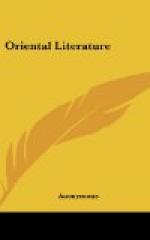Hadifah dissembled his contempt for these verses and the sheik who had pronounced them, but he ordered his son to go at once to Cais. Abou-Firacah started for the tribe of Abs, and as soon as he arrived there repaired to the home of Cais, who was absent. The messenger asked then for his wife Modelilah, the daughter of Rebia. “What do you desire of my husband?” she asked. “I demand my due, the prize of the horse race.” “Misfortune take you and that which you demand,” she replied. “Son of Hadifah! Do you not fear the consequences of such perfidy? If Cais were here he would send you to your death, instantly.” Abou-Firacah returned to his father, to whom he told all that the wife of Cais had said “What, you coward,” shouted Hadifah, “do you come back without completing your errand? Are you afraid of the daughter of Rebia? Go to him again.”
As Abou-Firacah reminded his father that it was now near night-fall, the message was postponed until the next day. As for Cais, when he re-entered his home, he learned from his wife that Abou-Firacah had come to ask for the camels. “By the faith of an Arab,” he said, “if I had been here I would have slain him. But the matter is closed; let us think no more of it.” Yet King Cais passed the night in grief and annoyance until sunrise, at which time he betook himself to his tent Antar came to see him. Cais rose, and making him take a seat, mentioned the name of Hadifah. “Would you believe he had the shamelessness to send his son to demand the camels of me? Ah, if I had been present I would have slain the messenger.” Scarcely had he finished uttering these words when Abou-Firacah presented himself on horseback. Without dismounting, and uttering no word of salutation or preface, he said: “Cais, my father desires that you send him that which is his due; by so doing your conduct will be that of a generous man; but if you refuse, my father will come against you, carry off his property by force, and plunge you into misfortune.”




